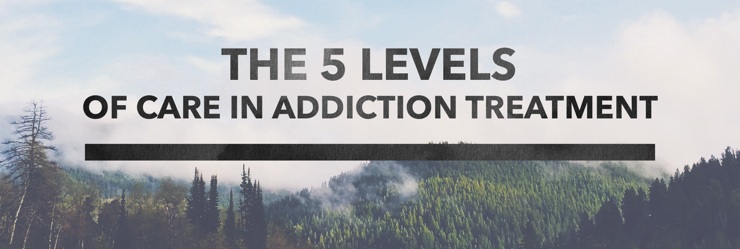For anyone struggling with addiction and substance use disorder, life can be a difficult, confusing and even dangerous situation. So when an individual finally makes the vital, life-saving decision to find help, the information they are given should be as clear as possible. Unfortunately, the care offered can sometime still be confusing.
It takes time for a substance use disorder to develop. That is why it also takes time for a person to overcome an addiction. As well, there is no single path to take. But essential, there are five different levels of care designed to help people overcome an addiction.
Drug or Alcohol Detox
When a person stops using heroin, alcohol, opioids, and many other drugs, they can experience dangerous withdrawal symptoms. Fortunately, withdrawals can be managed without putting your life at risk. Medically-guided detox will help mitigate the symptoms. In this kind of detox, individuals receive medical consultations and have a professional clinician monitoring them constantly during the initial detox stages. Some aspects of addiction treatment are optional, however, detox is typically not one of them. If you are interested in learning more about alcohol detox, here is a great place to start. For drug detox, find out more here.
Inpatient Rehab
Inpatient treatment is often referred to as residential treatment or rehab, for short. Many inpatient treatment facilities also offer medically-supervised detox. However, if the facility does not offer this, then you will have to complete detox before you go to the inpatient treatment center. At a detox only facility, you will often get guidance to what your next steps will be. They will also have relationships with multiple facilities and be able to help you find the best fit for your long-term treatment.
Studies have shown that inpatient rehab is extremely effective. You will stay at the facility during your entire treatment, which eliminates the possibility of finding and using any substances. You will also be able to go to individual therapy and group therapy and, depending on the location, make use of a variety of experiential and holistic treatment options.
Partial Hospitalization
Partial hospitalization is similar to inpatient treatment. However, you will have more freedom because you will be able to leave the facility. Many people choose partial hospitalization because they want to be able to keep up with their responsibilities with family or other realities. This is not the most ideal situation for many, but every person is different. And this option can be the right choice if your addiction counselor or psychologist believes it is a good fit.
Intensive Outpatient Treatment (IOP)
Many people get outpatient treatment after they have done inpatient rehab or partial hospitalization. If you go to outpatient treatment, then you will be able to get therapy and attend meetings with recovery groups. You will also be able to address the things that triggered substance abuse while you are in outpatient treatment. Like PHP, individuals in this level of care return home at the end of the day. However, IOP usually is not quite as time consuming as PHP.
Aftercare
Addiction can be overcome, and life will become happier and fuller. However, substance use disorder requires lifelong management. Because it is most intense during the beginning, aftercare is strongly recommended. All of the progress that you made while in treatment probably will not last unless it is enforced. Aftercare will help you avoid the toxic thoughts and behaviors that triggered your addiction.
Studies have shown that people who return to their normal routine after they receive treatment for an addiction have a tendency to relapse within four weeks. There are a variety of aftercare programs available. You can attend 12-step meetings, support groups, faith-based counseling, specialized workshops and recreational activities.
One of the many great things about aftercare is that you can stay in it as long as you need to. In fact, many people participate in aftercare several years after they have received treatment. Aftercare will help you stay on your sober journey for the rest of your life.
Detox Only Facility in Orange County, California
SoCal Detox specializes in the crucial first step of recovery: detox. However, our unique program also offers high levels of care in stabilization, assessment, and guidance. If you or your loved one is ready to start the conversation, or you simply have any questions, please call us today. Our addiction specialists are available for a free consultation and offer you the guidance you need: 888-590-0777.




